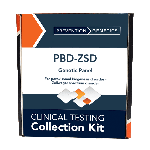
Peroxisomal biogenesis disorder-Zellweger spectrum disorder (PBD-ZSD) Test Program
Program Overview
No-cost genetic testing for 13 genes associated with peroxisomal biogenesis disorders is being offered for qualifying US-resident patients through a program sponsored by Mirum Pharmaceuticals. The genetic test helps identify peroxisome biogenesis disorder-Zellweger spectrum disorder (PBD-ZSD), a rare autosomal recessive disorder caused by mutations in one of 13 PEX genes and characterized by an impaired peroxisome assembly, leading to multiple enzyme deficiencies. Peroxisomal dysfunction affects nearly all cells of the body from fetal development throughout adult life.
Individuals who meet eligibility criteria can receive a no-cost, genetic test, ordered by a qualified healthcare provider, to help determine if they have PBD-ZSD.
Clinical Features 
PBD-ZSD are caused by defects in peroxisome assembly and formation. Clinical features and biochemical findings are associated with multiple abnormal enzymatic pathways in peroxisomes. Common clinical features of PBD-ZSD likely include vision, hearing, nervous system, and liver/growth impairment. PBD-ZSD was formerly thought of as 3 separate diseases (Zellweger syndrome [ZS], neonatal adrenoleukodystrophy [NALD], and infantile Refsum's disease [IRD]). However, they are now recognized as one disease that presents along a spectrum, with overlapping phenotypes and severity ranging from severe to mild/moderate.
Genetics 
PBD-ZSD disorders are inherited in an autosomal recessive manner and are caused by loss-of function variants in the relevant gene.
Genes in this panel include:
Peroxisome biogenesis disorders - Zellweger syndrome disorder (PBD-ZSD): PEX1, PEX2, PEX3, PEX5, PEX6, PEX10, PEX11B, PEX12, PEX13, PEX14, PEX16, PEX19, PEX26
Testing Strategy 
For this Next Generation Sequencing (NGS) test, sequencing is accomplished using exome capture probes (PGxome®).
Copy number variants (CNVs) are also detected from NGS data. All CNVs are confirmed using another technology such as aCGH, MLPA, or PCR before they are reported.
This panel typically provides ≥98% coverage of all coding exons of the genes listed, plus ~10 bases of flanking noncoding DNA. We define coverage as ≥20X NGS reads or Sanger sequencing.
Clinical Sensitivity 
Pathogenic variants in the PEX genes account for nearly all cases of clinically and biochemically diagnosed PBD-ZSD. The overall sensitivity of this sequencing panel test is predicted to be over 95% for DNA substitutions (missense, nonsense, splicing pathogenic variants), small insertions and/or deletions (frameshift and splice-site pathogenic variants) and gross deletions and duplications.
Criteria For Test 
This test is appropriate for individuals with clinical symptoms suggestive of a peroxisomal disorder.
Patients must meet one of the criteria below:
- Diagnosed peroxisomal biogenesis disorder − Zellweger spectrum disorder (PBD-ZSD)
- Clinical suspicion of peroxisomal biogenesis disorder − Zellweger spectrum disorder (PBD-ZSD) (e.g. neurological, vision, hearing, or hepatic deterioration)
Ordering 
Healthcare providers can request blood collection kits for the program by clicking the "Order Test Kits" button on this page.
- Determine if the individual meets eligibility criteria and discuss the test.
- Order the test and collect a blood specimen in two separate collection tubes and ship them to the lab.
- The genetic test will be processed at PreventionGenetics and the results will be sent to the ordering healthcare provider about 21 days after the lab receives the specimens and all appropriately completed paperwork. The ordering healthcare provider will discuss the results with the patient and / or caregiver.
- If the PBD-ZSD genetic test is positive, then a reflex biochemical analysis* will be performed to help identify the presence and concentration levels of DHCA/ THCA, atypical bile acids which can be hepatotoxic and associated with liver disease in PBD-ZSD.
- If the DHCA/THCA biochemical test is positive, CCHMC will send the results to you approximately two weeks after the specimen was received.
* Biochemical analysis is performed by Cincinnati Children's Hospital Medical Center (CCHMC).
- Follow instructions provided in test kit to collect the two specimens needed.
- Ensure all fields on the test requisition form are completed.
- Send specimens and completed test requisition form per shipping instructions below.
Specimen Collection and Shipping 
Specimen Requirements
Please collect two separate specimens in the collection tubes provided per the instructions below.
- PBD-ZSD Sequencing Panel Collection Instructions:
Collect 3 mL - 5 mL of whole blood in EDTA (purple top tube) or ACD (yellow top tube), minimum 1 mL for small infants. - DHCA/THCA Biochemical Testing Collection Instructions:
Collect 3 mL - 5 mL of whole blood in a serum tube (red top tube), minimum 1 mL for small infants.
Shipping and Handling Instructions
Using the prepaid shipping label provided, ship immediately to arrive to PreventionGenetics overnight, Monday-Friday. No weekend delivery.
Label the tubes with the patient's name, date of birth, and date of collection.
At room temperature or refrigerated, a blood specimen is stable for up to 8 days. Include a refrigerated gel pack in the shipping container. Fresh blood specimens are preferred. If frozen, a blood specimen is stable for up to 1 month before shipping. Frozen blood specimens should be shipped frozen (preferably on dry ice) overnight.





